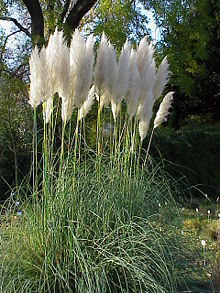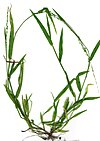Danthonioideae
| Danthonioideae | |
|---|---|

| |
| Pampas grass (Cortaderia selloana) | |
| Scientific classification | |
| Kingdom: | Plantae |
| Clade: | Tracheophytes |
| Clade: | Angiosperms |
| Clade: | Monocots |
| Clade: | Commelinids |
| Order: | Poales |
| Family: | Poaceae |
| Clade: | PACMAD clade |
| Subfamily: | Danthonioideae Barker & H.P.Linder |
| Tribe: | Danthonieae Zotov |
Danthonioideae is a mainly southern hemisphere subfamily of grasses, containing the single tribe Danthonieae and one unplaced genus,[1] with altogether roughly 300 species.[2] It includes herbaceous to partially woody perennial or annual (less common) grasses that grow in open grasslands, shrublands, and woodlands.[3] It belongs to the PACMAD clade of grasses, but unlike some other lineages in that clade, grasses in the Danthonioideae exclusively use the C3 photosynthetic pathway.[4] Its sister group is the subfamily Chloridoideae.[4]
There are 19 genera, 18 of which are placed in tribe Danthonieae, while one is as yet unplaced (incertae sedis).[1] The relationships within the group are complicated; conflicting phylogenetic evidence from nuclear and chloroplast DNA suggests that hybridisation events played an important role in the Danthonioideae.[5]
- incertae sedis:
- tribe Danthonieae:
- Austroderia, Capeochloa, Chaetobromus, Chimaerochloa, Chionochloa, Cortaderia (syn. Lamprothyrsus), Danthonia, Geochloa, Merxmuellera, Notochloe, Pentameris (syn. Pentaschistis, Poagrostis, Prionanthium), Phaenanthoecium, Plinthanthesis, Pseudopentameris, Rytidosperma (syn. Austrodanthonia, Monostachya, Notodanthonia, Pyrrhantherea), Schismus (syn. Karroochloa), Tenaxia, Tribolium
References
- ^ a b Soreng, Robert J.; Peterson, Paul M.; Romaschenko, Konstantin; Davidse, Gerrit; Teisher, Jordan K.; Clark, Lynn G.; Barberá, Patricia; Gillespie, Lynn J.; Zuloaga, Fernando O. (2017). "A worldwide phylogenetic classification of the Poaceae (Gramineae) II: An update and a comparison of two 2015 classifications". Journal of Systematics and Evolution. 55 (4): 259–290. doi:10.1111/jse.12262. hdl:10261/240149. ISSN 1674-4918.

- ^ Soreng, Robert J.; Peterson, Paul M.; Romaschenko, Konstantin; Davidse, Gerrit; Zuloaga, Fernando O.; Judziewicz, Emmet J.; Filgueiras, Tarciso S.; Davis, Jerrold I.; Morrone, Osvaldo (2015). "A worldwide phylogenetic classification of the Poaceae (Gramineae)". Journal of Systematics and Evolution. 53 (2): 117–137. doi:10.1111/jse.12150. hdl:11336/25248. ISSN 1674-4918. S2CID 84052108.

- ^ Grass Phylogeny Working Group; Nigel P. Barker; Lynn G. Clark; Jerrold I. Davis; Melvin R. Duvall; Gerald F. Guala; Catherine Hsiao; Elizabeth A. Kellogg; H. Peter Linder (2001). "Phylogeny and Subfamilial Classification of the Grasses (Poaceae)" (PDF). Annals of the Missouri Botanical Garden. 88 (3). Missouri Botanical Garden Press: 373–457. doi:10.2307/3298585. JSTOR 3298585.
- ^ a b Grass Phylogeny Working Group II (2012). "New grass phylogeny resolves deep evolutionary relationships and discovers C4 origins". New Phytologist. 193 (2): 304–312. doi:10.1111/j.1469-8137.2011.03972.x. hdl:2262/73271. ISSN 0028-646X. PMID 22115274.

- ^ Pirie, M. D.; Humphreys, A. M.; Barker, N. P.; Linder, H. P. (2009). "Reticulation, Data Combination, and Inferring Evolutionary History: An Example from Danthonioideae (Poaceae)". Systematic Biology. 58 (6): 612–628. doi:10.1093/sysbio/syp068. ISSN 1063-5157. PMID 20525613.

External links
 Media related to Danthonioideae at Wikimedia Commons
Media related to Danthonioideae at Wikimedia Commons Data related to Danthonioideae at Wikispecies
Data related to Danthonioideae at Wikispecies

